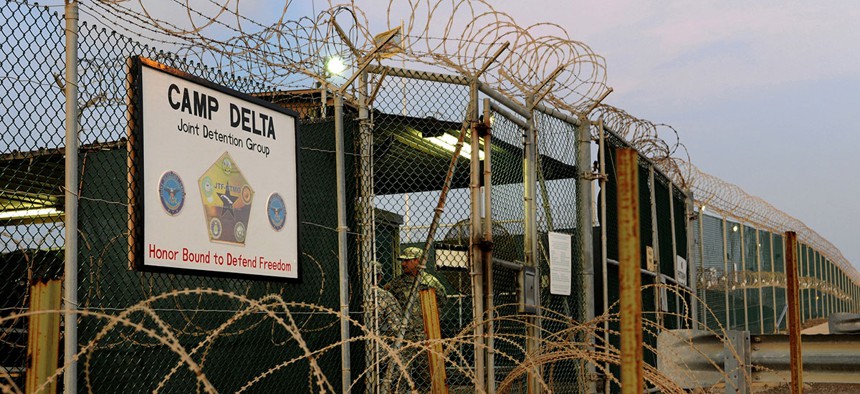
Tech. Sgt. Michael R. Holzworth/Air Force file photo
Obama Administration Again Delays Plan to Close Guantanamo
The long-awaited plan, due this past week, has been delayed indefinitely.
Obama administration officials once again have put an indefinite hold on submitting to Congress their plan to close the military prison at Guantanamo Bay, Cuba.
White House officials have been telling lawmakers for at least five months that they’re in the “final stages” of drafting the plan to close the facility. After delaying the plan to conduct surveys of potential alternative sites in Colorado, South Carolina and Kansas, officials and lawmakers said it would come this past week. Now, the plan has been held and is not expected until sometime in the next month.
White House and Pentagon officials wouldn’t comment on the reason for the pause, but previous delays have been due to decisions to flesh out the plan with more details, particularly on costs.
White House spokesman Josh Earnest said, “I don’t have any additional guidance for you beyond just letting you know that the promised plan that we said that we’d present to Congress is something that will come relatively soon.”
“We’re looking to have it potentially soon,” Pentagon spokesman Cmdr. Gary Ross said Friday, but “nothing imminent.”
Obama is wheels up for the G20 meeting in Turkey and several other stops until Nov. 23, but that doesn’t rule out the plan being released while the president is gone, officials said. The Pentagon will take the lead on the rollout, having conducted the surveys that informed the plan and been “principally responsible” for the drafting, Earnest said Thursday. He said that doesn’t reflect any diminished importance to Obama.
“This was the highest-profile announcement that the president made on his second full day in office, his commitment to closing the prison at Guantanamo Bay,” he said, adding it is “a top priority for the president personally.”
While insisting the plan is “no big mystery,” he said to expect “a carefully considered, thoughtful plan that will include some specifics that heretofore have not been previously discussed.”
Having the Defense Department submit the plan to Congress emphasizes the security side of the detainee issue, in order to help defuse the political outcry.
The delay may have cost the administration its most important ally for the push to close Guantanamo, Sen. John McCain, R-Ariz. The Senate Armed Services Committee chairman has grown increasingly frustrated with the delays to a plan he has demanded for years.
“From what I’m hearing, it’s a series of options, which is of course a bad joke … we want a plan. Where do you want to send them?” he said. “How am I supposed to consider five or six different places? That’s not a plan, that’s a Chinese menu.”
McCain told Defense One in early June that the White House was drafting the plan. He tried to introduce language into the annual defense authorization bill, or NDAA, that would’ve provided the president the authority to achieve his goal — if the White House submitted the plan and Congress approved it. But the NDAA moved through Congress quickly, the plan never came, and the president will sign the bill into law, the White House said, likely early this week.
The bill adds new restrictions and extends existing ones designed to make it more difficult for the administration to continue to chip away at the 107 detainees who remain at Guantanamo. The administration insists it will continue to use transfers to other countries, and on Sunday moved five detainees to the United Arab Emirates. But the bill extends the ban transferring detainees to the U.S., as well as using any funds to modify existing facilities or construct new ones to hold detainees on U.S. soil.
Obama’s signature on the NDAA will lock in this legislative freeze on Guantanamo, which lawmakers intend to last into 2017 – and outlast the president.
McCain and his counterpart in the House, Chairman Mac Thornberry, R-Texas, said lawmakers won’t change the NDAA, and aren’t likely to become more cooperative for next year’s bill, particularly given this is likely the last Obama will sign before the next president is chosen in November 2016. Administration officials have suggested a provision lifting the restrictions on U.S. facilities could be attached to another piece of legislation — such as an omnibus spending bill expected before the next shutdown deadline on Dec. 11 — but there’s no appetite for that either.
The administration has refused to rule out executive action, even with lawmakers threatening to hold up the president’s nominations and legislative agenda, or, if it comes to it, take him to court.
Sen. Pat Roberts, R-Kansas, whose state is home to military barracks at Fort Leavenworth that have been considered for years, is blocking Obama’s nominations to thwart the possibility of a unilateral move, and has held his nominee for Army secretary, Eric Fanning, since September.
McCain said the administration’s true intention with the plan is to check a last box so they can argue Congress left them no choice but executive action. “Of course, that’s what this is all about,” he said. “I think he will again continue to abuse the Constitution of the United States … Of course it’s not in his authority. There’s a line in the defense authorization bill that prevents him from doing so.” But as for what recourse he and other lawmakers have, he said, “Go to court. Go to court. That’s all we can do: go to court.”
The Obama administration has long dangled administrative action as a threat, saying, as Earnest did Thursday, “We’re not going to take anything off the table when it comes to what the president can do to accomplish his goal, but our strong preference would be to engage Congress.”
White House and Pentagon officials decline to confirm whether legal counsel has determined the extent of Obama’s authority to close Guantanamo unilaterally.
“I think if this is an issue that ends up in court,” Earnest said, “it will be as a result of the abject failure of the U.S. Congress to put the national security interests of the United States first.”
Still, referring to McCain’s threats, he grimly quipped, “That gives you a pretty good sense of what we’re up against, right? Even our friends on this issue are threatening law suits.”
NEXT STORY: ISIS Threatens Attack on Washington







